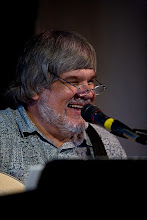The McCartney family occupied a place in Liverpool society a rung or two lower than George and Mimi Smith. Jim McCartney was a cotton salesman, a reasonably secure job when Liverpool was a thriving port. Mary McCartney brought in some extra money as a nurse/midwife. Unlike the Smiths who owned their own half of a semi-detached home, they had to rely on government supported council housing, but there was no shame in that. (Photo of 20 Forthlin Road.) They had "a couple of kids running in the yard" called Paul and Michael.
In his younger days, Jim was a good amateur musician, a valued friend in that time and place. He told the kids that they should learn to play an instrument, "because that way they'd always be invited to parties". A piano was part of the McCartney home furniture (obtained from the Epstein family's furniture store). Paul grew up in a much more stable, though less affluent, home environment and was a more friendly, less rebellious type than JL.
A dark cloud obscured the sunshine of this home when Mary fell victim to breast cancer, a disease against which there was little that could be done by the medicine of that time. Paul was 14 and a promising student at the prestigious Liverpool Institute.
Tuesday, February 16, 2010
Tuesday, February 9, 2010
In the Beginning
John Lennon was born on the 9th of October, 1940 while the Battle of Britain was being fought over the skies of that country. Because of the war, attitudes were rapidly changing. Young people, not knowing when they would be called off to fight or be buried under a large pile of rubble by a bomb began to adopt a live-for-today philosophy. Julia Stanley, John's mother, certainly seemed to be an example of that. Of course, even the most free-thinking of young men of that time knew that getting a girl pregnant meant a quick trip down to the registry office to "tie the knot" and that's just what Alfred Lennon and Julia had done.
That relationship lasted until Alf decided his future lay elsewhere than the north of England. The five year old John was given the choice of going with his dad, maybe to New Zealand, or staying with his mother in Liverpool. Pretty hard to imagine expecting a little boy to make a life altering decision for himself, but I guess times were different then. (Listen to "I'll Be Back" sometime with that thought in mind.)
Soon, John was sent off to live with his Aunt Mimi Smith. Mimi was Julia's childless older sister who was living with her husband George in a middle class suburb of Liverpool called Woolton Village. Mimi was very much from the old school of domestic relations and child rearing. John, on the other hand, was a born iconoclast and that led to many a conflict in the Smith household.
Meanwhile, as the wave of war babies got older, a new class of kids, called teenagers, was born. American music, such as that from Lonnie Donegan, with it's free rhythms and grass roots lyrics was a natural attraction to them in general and John in particular. It's not difficult to see that beneath her hard exterior, Mimi had a soft heart when John managed to talk her into buying a mail order guitar for him. It was 1956 and he was 16 years old.
That relationship lasted until Alf decided his future lay elsewhere than the north of England. The five year old John was given the choice of going with his dad, maybe to New Zealand, or staying with his mother in Liverpool. Pretty hard to imagine expecting a little boy to make a life altering decision for himself, but I guess times were different then. (Listen to "I'll Be Back" sometime with that thought in mind.)
Soon, John was sent off to live with his Aunt Mimi Smith. Mimi was Julia's childless older sister who was living with her husband George in a middle class suburb of Liverpool called Woolton Village. Mimi was very much from the old school of domestic relations and child rearing. John, on the other hand, was a born iconoclast and that led to many a conflict in the Smith household.
Meanwhile, as the wave of war babies got older, a new class of kids, called teenagers, was born. American music, such as that from Lonnie Donegan, with it's free rhythms and grass roots lyrics was a natural attraction to them in general and John in particular. It's not difficult to see that beneath her hard exterior, Mimi had a soft heart when John managed to talk her into buying a mail order guitar for him. It was 1956 and he was 16 years old.
Subscribe to:
Posts (Atom)








